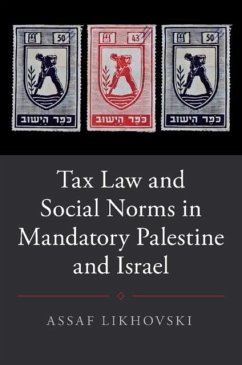This book describes how a social-norms model of taxation rose and fell in British-ruled Palestine and the State of Israel in the mid-twentieth century. Such a model, in which non-legal means were used to foster compliance, appeared in the tax system created by the Jewish community in 1940s Palestine and was later adopted by the new Israeli state in the 1950s. It gradually disappeared in subsequent decades as law and its agents, lawyers and accountants, came to play a larger role in the process of taxation. By describing the historical interplay between formal and informal tools for creating compliance, Tax Law and Social Norms in Mandatory Palestine and Israel sheds new light on our understanding of the relationship between law and other methods of social control, and reveals the complex links between taxation and citizenship.
Dieser Download kann aus rechtlichen Gründen nur mit Rechnungsadresse in A, B, BG, CY, CZ, D, DK, EW, E, FIN, F, GR, HR, H, IRL, I, LT, L, LR, M, NL, PL, P, R, S, SLO, SK ausgeliefert werden.

